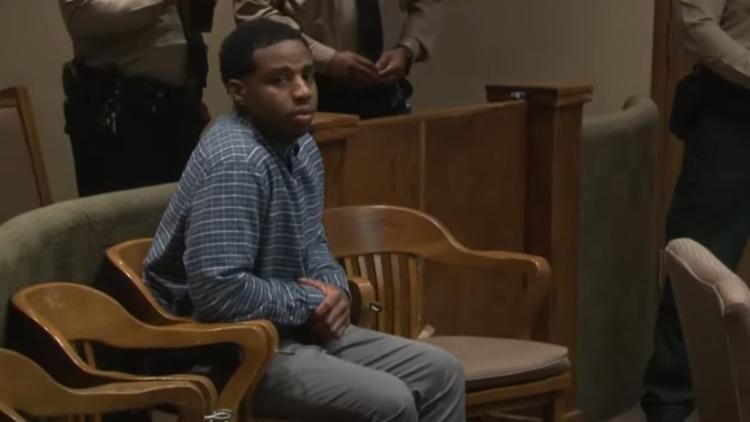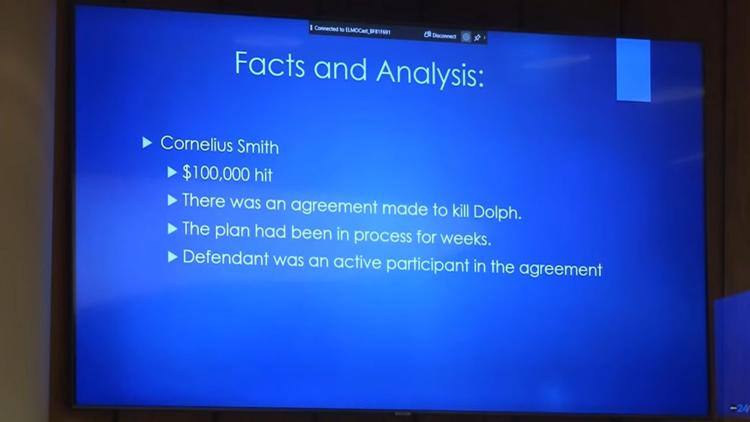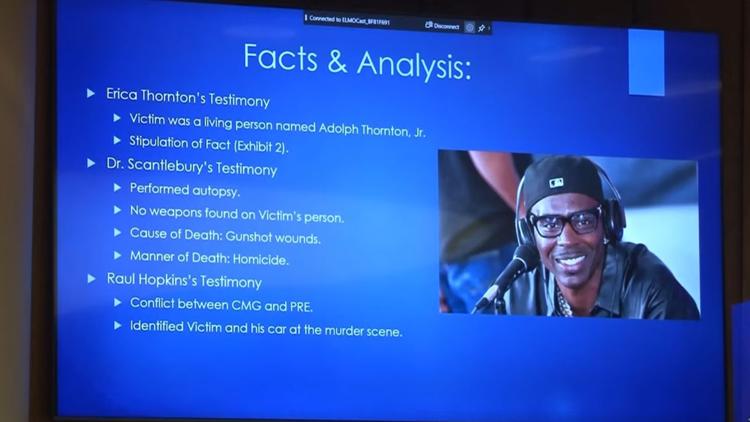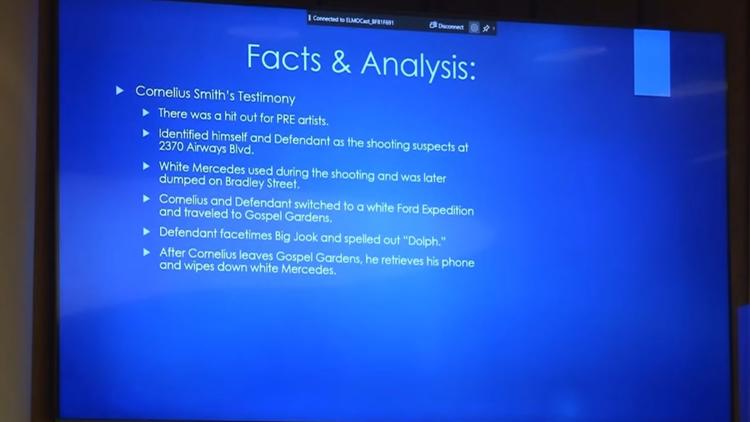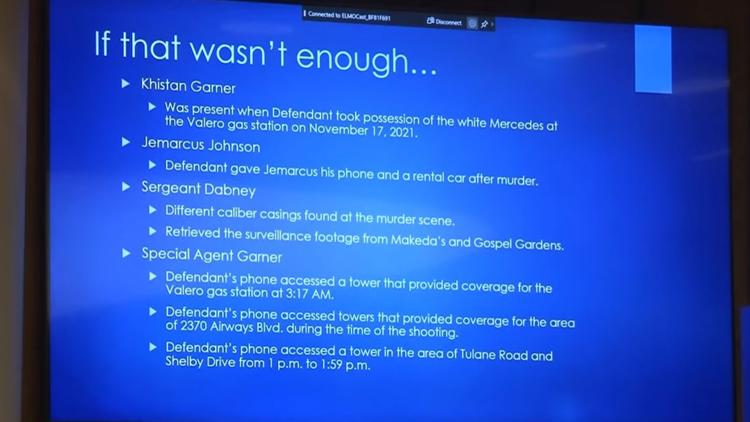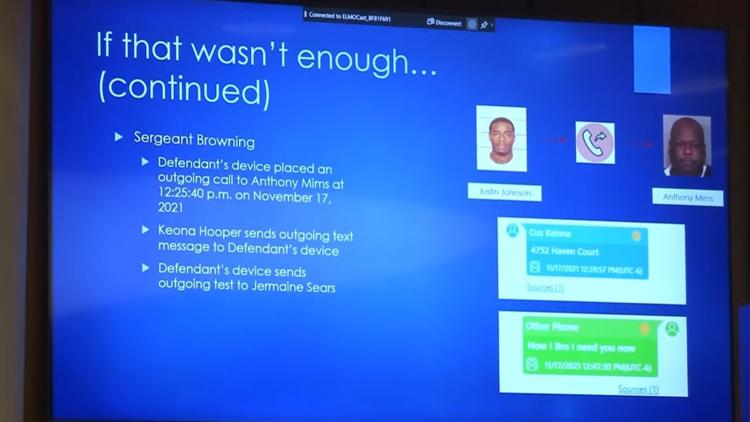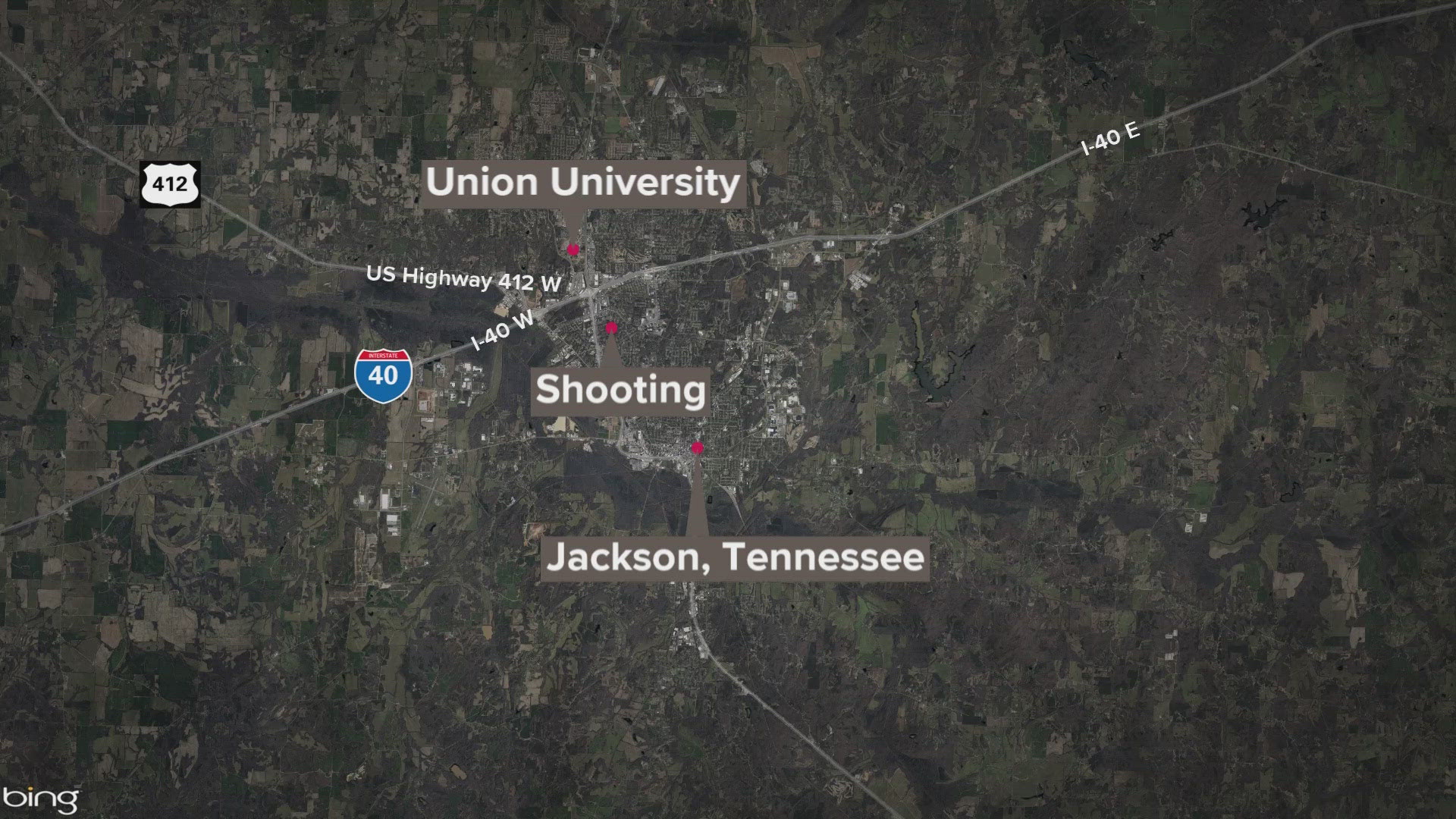MEMPHIS, Tenn — The jury headed into deliberations about noon Thursday in the trial of the man charged in the murder of Memphis rapper Young Dolph, after closing arguments that morning.
As day four of the trial began Sept. 26, 2024, the defense rested its case without calling a witness.
Wednesday, Justin Johnson took the stand briefly, only to say he would not testify on his own behalf.
The charges
After the defense rested, the judge explained the charges Johnson faces to the jury.
Those are:
Count 1 of the indictment:
- Conspiracy to commit first-degree murder
- Lesser offense
- Facilitation to wit: conspiracy to commit first-degree murder
- Lesser offense
Count 2 of the indictment:
- First-degree murder
- Lesser offense
- Second-degree murder
- Facilitation to wit: first-degree murder
- Facilitation to wit: second-degree murder
- Voluntary manslaughter
- Aggravated assault
- Facilitation to wit: voluntary manslaughter
- Facilitation to wit: aggravated assault
- Simple assault
- Facilitation to wit: simple assault
- Lesser offense
Count 3 of the indictment:
- Convicted felon in possession of a firearm
The judge said the jury can find Johnson guilty of the original charges or the lesser charges, or find him not guilty on the charges.
Young Dolph, whose real name was Adolph Thornton Jr., was shot and killed at Makeda's Cookies on Airways Boulevard on Nov. 17, 2021. Police said two men got out of a stolen Mercedes-Benz and fired shots into Makeda’s Homemade Cookies, where Young Dolph was making a purchase.
Prosecutors claimed the shooting was part of a rap feud between Dolph’s Paper Route EMPIRE (PRE) label and Yo Gotti’s Collective Music Group (CMG – aka Cocaine Muzik Group).
Prosecutors charged Johnson and Cornelius Smith as the suspects who fired at Dolph. Smith took the stand against Johnson, admitting to the killing and claiming he and Johnson were offered money for the hit by a third man who is charged, Hernandez Govan, and Big Jook (Anthony Mims, Yo Gotti’s brother who was killed in January 2024).
During opening statements, the defense said they expected Govan to take the stand, but he did not testify. Govan remains charged in Dolph’s death.
Justin Johnson’s half-brother Jermarcus Johnson took the stand for the prosecution. Jermarcus pleaded guilty to three counts of accessory after the fact in October 2023 in exchange for information into other suspects in the case. He faces six to 12 years in jail.
Closing arguments
Prosecution
During closing arguments, the prosecution began by going through the charges, explaining how the testimony correlated to the charges.
“It’s not 1981 anymore…” said Assistant District Attorney (ADA) Irris Williams. “It’s hard to keep a secret. It’s hard to hide who you’re talking to. It’s harder to hide your actions. And it’s even harder to hide who you know.”
The ADA then went through the testimony the jury heard, including the family and friends, and the expert witnesses.
ADA Williams also went through Smith’s testimony bit-by-bit – how there was a hit for PRE artists, how Smith said he and Johnson killed Dolph, the white Mercedes that was used, and what happened after the shooting. The prosecutor said Smith testified that after the shooting, Johnson facetimed Big Jook and spelled out ‘DOLPH.’
Williams also went through video footage and cell phone tracking evidence that prosecutors said linked Johnson to the shooting at Makeda’s, including video from Crosstown Concourse, a Valero gas station, and Gospel Gardens - Haven Court apartments.
The ADA also explained the standard of proof of “beyond a reasonable doubt,”
“Reasonable doubt is not 100% certainty,” said Williams. “It is not beyond a shadow of a doubt. It’s not beyond all doubt. What’s required is moral certainty. Certainty that allows you to sleep well at night.”
Hagerman closed his arguments by quoting Young Dolph.
"Too real," said Hagerman. "It's time for us to be real."
Young Dolph murder: Portion of slides from prosecution closing
Defense
Defense attorney Luke Evans told the jury they were about to go to work as he began his arguments.
“It’s difficult because what you’ve heard is the tragedy of someone losing their life,” said Evans. “The court will tell you, as terrible as that is, you can’t consider that when your determining guilt or innocence in this case.”
Evans spoke about Johnson as an aspiring rapper (Johnson’s rap name was Straight Drop), and how his fate is in the jury’s hands.
“It’s never justice to wrongfully convict someone,” Evans told the jury.
Evans told the jury that though they hadn’t been permitted to talk about the case, but now is the time.
The defense attorney also tried to poke at Smith’s testimony and claims that he testified because his conscience bothered him.
“He didn’t kill Adolph Thornton Jr. He didn’t conspire to kill Adolph Thornton Jr,” said Evans. “And he wasn’t the man holding the pistol in the Makeda video.”
Evans said the state didn’t want to acknowledge that similar doesn’t mean the same when it comes to the clothes shown on the suspect in the video of Makeda’s and the videos prosecutors claimed showed Johnson in other locations. He also said there was no video actually showing Johnson in the Mercedes.
“As jurors, you get to make that call,” said Evans.
The defense also agreed with the prosecution, “it’s not 1981 anymore.” Evans then went on to talk about advancements in forensics, but how he said those forensics didn’t connect to Johnson.
Evans also went through other testimony, pointing out what he said were lies by other witnesses. He also said Johnson was not present for any meetings discussing a hit on Dolph, even by Smith’s testimony.
“Where’s the agreement?” said Evans. “He wasn’t there.”
The defense also pointed out that the jury would be responsible for determining the credibility of the testimony, especially Smith’s as “accomplice testimony.” He said Smith has an interest in how Johnson’s case goes, hoping to get special consideration from the state.
“He’s gaming everybody, including trying to game y’all,” said Evans.
The defense also questioned the video time stamp ‘mistake’ made by the prosecution, explaining how it makes a difference in the timing of the events.
Evans also brought up that Hernandez Govan did not testify as the defense expected, calling him a "missing witness", and that there were no videos from Govan’s home. He said without Govan’s testimony, the jury won’t be able to compare it to Smith’s.
"Justin Johnson, he doesn't have anything to prove here. They do," said Evans, pointing at the prosecution.
Prosecution rebuttal
During the prosecution's rebuttal in the closing arguments, Shelby County Deputy District Attorney Paul Hagerman pointed out "missing witness" Hernandez Govan is charged and has the right not to testify and incriminate himself.
Hagerman also hit on some of the arguments Evans made, pointing out the evidence presented to the jury. He also said they have Johnson's actual phone, which the prosecution said connects him to the murder.
Addressing the defense's assertion that Smith was lying to get a deal from the state, Hagerman said Smith was talking because he was caught and wanted to make his sentence lighter.
The Deputy DA also pointed out that Johnson took off after the murder, leaving Memphis as the manhunt for Dolph's killers began.


